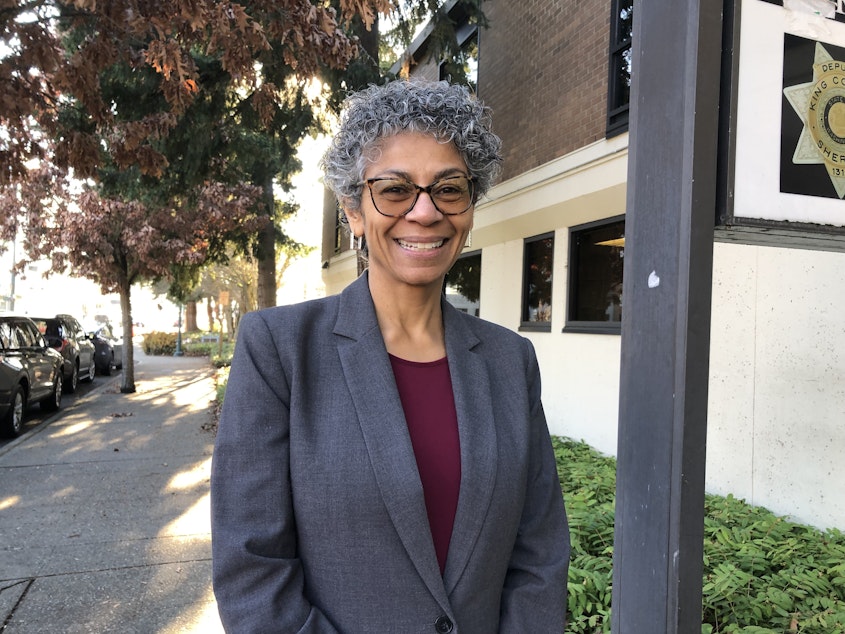'It's tough.' King County Sheriff Patti Cole-Tindall goes back to the academy

“Humbling.” That’s how King County Sheriff Patti Cole-Tindall describes going through the police academy in her late 50s. She’s five weeks into the 19-week process. Not that she’s counting.
It might sound like a sitcom. But for King County Sheriff Patti Cole-Tindall, it’s feeling very real.
“I am much older than many of my classmates and some days it’s hard, you know, I’m bumping up to 60 here so it’s tough, right?” she said.
Cole-Tindall went through the state police academy years ago, but she was in and out of law enforcement over her career. She became interim sheriff last January and was appointed to the permanent job in May. As part of that appointment, she has to go back to the academy to get her certification.
Monday through Thursday, she’s at the Criminal Justice Training Center in Burien bright and early at 6:30 a.m. with her fellow recruits.
“So we say the Pledge of Allegiance together and then we get down and we do two-count pushups with — let me just say, a bullet-proof vest, and a gun belt, and my full gear,” Cole-Tindall said.
Sponsored
Her training includes hands-on tactics and firearms, as well as the legal cases that guide police work. Her undersheriff is running the agency day-to-day. She’s in touch by phone and back in the sheriff’s office on Fridays.
Cole-Tindall said walking in the shoes of these young recruits will be a benefit to her as a leader. She’s scheduled to graduate at the end of March.
That’s also when the public will start to see deputies using body-worn cameras. The Sheriff’s Office is implementing the body cams as well as in-car cameras in the coming year. Cole-Tindall said the cameras will be implemented one precinct at a time, starting with deputies in Southwest King County.
“By the end of March we will have some deputies actually wearing body cams," she said. "And we’ll have our SWAT team as well outfitted even though they may not be in the same precinct.”
She said SWAT officers are a priority for the cameras because they respond to such critical incidents where video will be important. Her goal is for all deputies in patrol to have cameras by the end of 2024.
Sponsored
The county’s Office of Law Enforcement Oversight, or OLEO, has criticized the agency’s new body cam policies in serious force incidents as insufficient, for allowing officers to watch the videos before being interviewed.
Cole-Tindall said she thinks the policy does go far enough, in that officers are required to write an initial statement before viewing the video.
“After they’ve written the initial statement, we then show them the video and they would note what additional information they recalled after seeing the video," she said. “Allowing the offices to view the video after their initial statement is consistent with most other law enforcement agencies not only in the state but in the country.”
OLEO also raised concerns about the amount of decision making officers have to make to turn their cameras off to protect someone’s privacy. OLEO Director Tamer Abouzeid wrote in a letter in November, “The fact of the matter is, there will be some instances where recording should not occur. But a deputy cannot possibly know what will develop in any given situation. That is why the right place to exercise discretion is during the review, retention, redaction, and release stages.”
Cole-Tindall said she thinks the policy will be adequate.
Sponsored
“The expectation is they have that camera on,” she said. “There some things that will happen automatically. If they take their firearms out of their holster, the camera will turn on and they can’t turn it off. And the same thing with the Taser.”
Another priority in the coming year will be expanding new types of crisis response. Cole-Tindall said she wants to eventually have mental health workers on staff. Several cities in North King County offer mental health responders through the Radar Navigator program.
Cole-Tindall said that response is lacking in general in South King County.
“Currently Burien has started a program, it’s with Fire, a mental health provider and law enforcement as needed, and we will be looking to provide some other types of co-responder models in South County because we know there’s a big need and that’s something we need to address," she said.
She said her office is currently taking applications for a new Community Advisory Board, to provide more transparency than she said the agency has had in the past.
Sponsored
Another focus in the coming year will be the formation of a new unit focused on reducing gun violence.
“The Executive proposed and the council approved a gun violence reduction unit that will have four deputies and a sergeant. The focus of that unit will be to get guns off the street, and also focus on the reduction of gun violence in the King County area,” she said.




